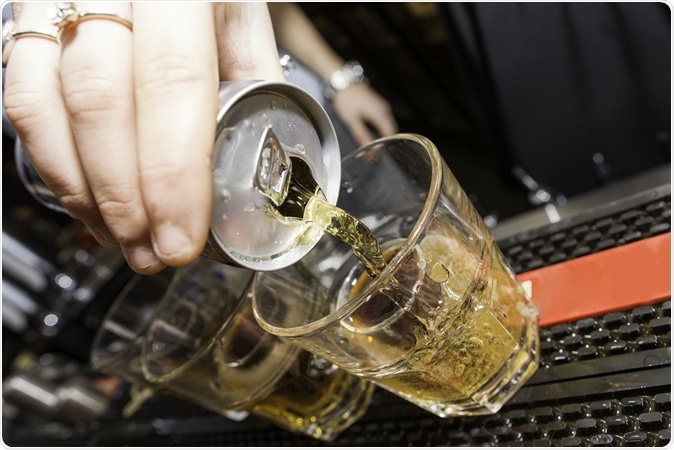It has been found that one third of college going American students eventually end up becoming cocaine addicts or have abuse problems with alcohol or prescription medications. Further one third of all college going students between ages 21 and 24 are habitual consumers of energy drinks. A new study has linked these two behaviors and noted that students who take energy drinks on a regular basis are more likely to abuse drugs or alcohol as they grow up. The study was published in the journal Drug and Alcohol Dependence.
Researchers from the University of Maryland looked at 1,099 college students over a four year study period for this study. They noted the health and risk-taking habits of these youths. They concluded from the results that those study subjects that habitually drank high amounts of caffeinated drinks later had a greater propensity to become addicted to cocaine, alcohol, or other illicit substances compared to students who did not take these beverages.

Image Credit: Ash Pollard / Shutterstock
Amelia Arria, an associate professor and lead author of the study explained that this study is one of those that connect the actual contribution of these energy drink consumptions with abuse liability. She worked with members of the Center on Young Adult Health and Development (CYAHD) for this extensive study. There have been earlier studies from the CYAHD researchers that excess consumption of energy drinks was linked to high-risk drinking behaviors and other drug abuse. But this is the first to quantify that connection.
Results showed that a little over half (51.4 percent) of youth remained on what the researchers termed as “persistent trajectory”. This means that their energy drink consumption remained steady and sustained over a period of time and beyond. Another group remained in the “intermediate trajectory” – 17.4 percent. This means that they remained at risk of using cocaine after their initial high energy drink consuming behavior. This was comparable to those who did not use these caffeinated beverages at all falling in the “non-use trajectory” at 20.6 percent. These “non-use” group and a group called the “desisting trajectory” that showed a decline in use of caffeinated energy drinks with time both showed no higher risk for any substance abuse. This means non users and those that declined in their usage were not at a greater risk for hard drug abuse later in life.
However the study could not find the reason that connected these two events. Some of the possible explanations for this link could be the fact that those consuming more energy drinks could be the ones succumbing more to peer pressure or could be the ones who have higher risk-taking behaviors. These and probably the changes in the brain due to these caffeinated stimulant drinks could be the reason for this connection say researchers.
What worry the researchers are the fact that there is little or no intervention and regulation when it comes to the caffeine content of these energy drinks. Experts feel that he Food and Drug Administration (FDA) need to impose caffeine limits on these products. Further information and warnings should be in place for youths. These graphic and explanatory warnings should be placed on labels and advertisements to deter their use.
American Beverage Association vice president William Dermody of course found that this study was deeply flawed in its methodology and should not be considered to be the final answer to this problem. He explained that these energy drinks and their effects have been studied extensively worldwide and have been considered safe for consumption by more than one government authorizes. He said that this study did not counter any of the safety facts that have already been established. Dermody noted that most of these energy drinks contain less caffeine than a cup of coffee and most of the caffeine that is obtained by the population is from sources other than energy drinks. He added that the FDA already has regulations placed regarding the ingredients and labeling of energy drinks.
All said, energy drinks have never really been out of news. Early this year a case report was released by Sydney’s Royal Prince Alfred Hospital that showed that youth who had no earlier history of heart disease could succumb to a cardiac arrest after just one drink. In Australia, the study stated, each drink contained 320 milligrams of caffeine per litre and this was equivalent to four cups of coffee. Cardiologists believe the use of these drinks should be regulated provided the risks they pose. Other problems posed by heavy use of these energy drinks include headaches, insomnia and stomach problems.
References: http://www.drugandalcoholdependence.com/article/S0376-8716(17)30332-0/abstract and https://umd.edu/